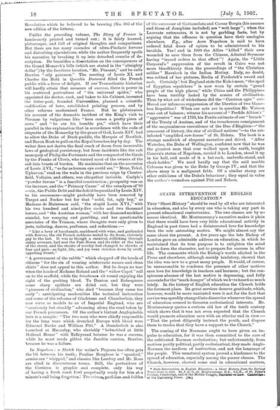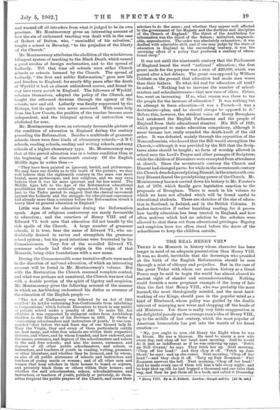STATE INTERVENTION IN ENGLISH EDUCATION.*
Tins "Short History" should be read by all who are interested in education, and also by every one who is taking any part in present educational controversies. The two classes are by no means identical. Mr. Montmorency's narrative makes it plain that there would have been very little educational activity in England in past times had a disinterested love for knowledge been the sole animating motive. We might almost say the same about the present. A few years ago the late Bishop of London gave an admirable address on education, in which he maintained that its true purpose is to enlighten the mind and to form the character, not to prepare for success in after life. The comments which the Bishop's words elicited in the Press and elsewhere, although mainly laudatory, showed that the idea was new to a great many people. It would, of course, be unreasonable to condemn the presence of other motives save love for knowledge in teachers and learners ; but the con- spicuous absence of the last motive is depressing, and fully accounts for the "mark-hunger" of which we bn,ve heard so much lately. In the history of English education the Church holds the foremost place. Its great services deserve gratitude, which, however, would be more unstinted were it not for the fact that service was speedily changed into disservice whenever the spread of education seemed to threaten ecclesiastical interests. Mr. Montmorency quotes a curious old law of the tenth century which shows that it was not even expected that the Church would promote education save with an ulterior end in view :— " That the priest diligently instruct the youth, and dispose them to trades that they have a support to the Church."
The coming of the Normans ought to have given an im- pulse to education, for it was then committed to the care of the cultivated Norman ecclesiastics ; but unfortunately, from motives partly political, partly ecclesiastical, they made Anglo- Norman the medium of instruction, and not the language of the people. This unnatural system proved a hindrance to the spread of education, especially among the poorer classes. The Church, however, showed some zeal in educational matters,
• State Intervention in English Education: a Short History from the Earliest Times down to I&O. By J. E. G. de Montmorency, B.A., LL.B., of St. Peter's College, Cambridge, and of the Middle Temple, Barrieter-at-Law. Cambridees at the that-emit" Press. Dal
and warned off all intruders from what it judged to be its own province. Mr. Montmorency gives an interesting account of how the sin of unlicensed teaching was dealt with in the case of Robert of Dalton, who, "unmindful of his salvation," taught a school in Beverley, "to the prejudice of the liberty of the Church."
Mr. Montmorency attributes the abolition of the mischievous bilingual system of teaching to the Black Death, which caused a great exodus of foreign ecclesiastics, and to the spread of Lollardy. Till that time all schools were either Church schools or schools licensed by the Church. The spread of Lollardy. "the first and nobler Reformation," gave new life and freedom to England; for nearly fifty years after the death of Wycklif it had an almost unhindered course, and found its way into every parish in England. The followers of Wycklif, scholars themselves, adopted the policy of the Church, and
taught the reformed doctrine through the agency of the schools, new and old. Lollardy was finally suppressed by the Bishops. but its spirit was never exorcised. With some help from the Law Courts, the position of the teacher became more independent, and the bilingual system of instruction was abolished for ever.
Mr. Montmorency draws an extremely favourable picture of the condition of education in England during the century preceding the Reformation. Besides a multitude of grammar schools, there were four kinds of elementary schools,—A B C schools, reading schools, reading and writing schools, and song schools of a higher elementary type. Mr. Montmorency says that at this period education was in a better condition than at the beginning of the nineteenth century. Of the English Middle Ages he writes thus :—
" They have been painted as ignorant, brutal, and picturesque. We may have our doubts as to the truth of the picture; we may well believe that the eighteenth century in the mass was more brutal, more picturesque, and less religions, and we may even believe that it was far more ignorant and far less moral. The Middle Ages left to the Age of the Reformation educational possibilities that were recklessly squandered, though it is only just to the Tudor period to suggest that the clerical movement against the Lollards and the struggle for educational supremacy had already more than a century before the Reformation struck a heavy blow at general education in England."
Little was done for education during the Reformation epoch. Ages of religious controversy are rarely favourable
to education ; and the courtiers of Henry VIII. and of Edward VI. took care that education did not benefit by the rich spoils of the Church. A large number of grammar schools, it is true, bear the name of Edward VI., who un- doubtedly desired to revive and strengthen the grammar school system ; but his good intentions were frustrated by his Commissioners. Very few of the so-called Edward VI. grammar schools had their origin in the reign of that Monarch, being older foundations with a new name.
During the Commonwealth some tentative efforts were made in the direction of nat;onal education, of which an interesting account will be found in Mr. Montmorency's volume. But with the Restoration the Church resumed complete control, and what was perhaps not unnatural, the Church was now clad with a double portion of the spirit of bigotry and suspicion. Mr. Montmorency gives the following account of the manner in which an Archbishop understood his duties as overseer of the education of the English people
:- "The Act of Uniformity was followed by an Act of 1665 entitled' An Act for restraining Non-Conformists from inhabiting in Corporations,' which forbade Dissenters to teach in any public or private school under a penalty of £40. To make the Act effective it was supported by stringent orders from Archbishop Sheldon to the Bishops of his Province in 1665. By Order 4, concerning schoolmasters and instructors of youth,' it was com- manded that before the said feast day of our blessed lady St. Mary the Virgin, they and every of them particularly certify me, how many, and what free schools are within their respective dioceses, and where, and by whom founded, and how endowed, and the names, surnames, and degrees. of the schoolmasters and ushers in the said free schools; and also the names, surnames, and degrees of all other public schoolmasters, and ushers, or instructors, and teachers of youth in reading, writing, grammar, or other literature, and whether they be licensed, and by whom ; as also of all public mistresses of schools and instructors and teachers of young maids or women ; and of all other men and women that keep scholars in their houses to board or sojourn, and privately teach them or others within their houses; and whether the said schoolmasters, ushers, schoolmistresses, and instructors, or teachers of youth, publicly or privately, do them- selves frequent the public prayers of the Church, and cause their scholars to do the same ; and whether they appear well affected to the government of his Majesty and the doctrine and discipline of the Church of England: The thirst of the Archbishop for information was the thirst of the Sahara; unlimited, unquench- able, unproductive. The order was absolutely exhaustive; it was drafted with admirable skill, and if one may judge by the state of education in England in the succeeding century, it was the crowning effort of a policy that produced a century of educa- tional sleep."
It was not until the nineteenth century that the Parliament of England heard the word "national" education ; the first grant made for the purpose was a sum of 220,000, which was
passed after a hot debate. The grant was opposed by William Cobbett on the ground that education had made men worse than their fathers. To what did zeal for education all tend ? he asked. "Nothing but to increase the number of school- masters and schoolmistresses—that new race of idlers. Crime, too, went on increasing. If so, what reason was there to tax the people for the increase of education ? It was nothing but an attempt to force education—it was a French—it was a doctrinaire—plan, and he should always be opposed to it." Before this, however, the strident voice of Henry Brougham had awakened the English Parliament and the people of England from their educational slumber. His Bill of 1820, which proposed to make education compulsory, although it never became law, really sounded the death-knell of the old order. It was defeated, mainly through the opposition of the Nonconformists, who feared that the Bill would strengthen the Church,—although it was provided by the Bill that the Scrip- tures alone should be taught; no form of worship allowed in school save the Lord's Prayer and other passages of Scripture; while the children of Dissenters were exempted from attendance at church. Since the seventeenth century the Church and Dissent had changed parts: for while in the seventeenth century the Church dreaded proselytising Dissent, inthe nineteenth cen- tury Dissent feared the proselytising power of the Church. Mr. Montmorency has not carried down his history to Mr. Forster's Act of 1870, which finally gave legislative sanction to the proposals of Brougham. There is much in his volume to which we have not alluded which will be found useful to educational students. There are sketches of the rise of educa- tion in Scotland, in Ireland, and in the British Colonies. It makes instructive if rather humbling reading, for it proves how hardly education has been treated in England, and how often motives which had no relation to the scholars were allowed to shut them out from educational privileges. Bigotry and suspicion have too often stood before the doors of the schoolhouse to keep the children outside.















































 Previous page
Previous page